Click Here for the “Step By Step:
Install 11g R2 RAC on Oracle Enterprise Linux”
Pre-Installation tasks of
Installing Oracle 11g R1 Real Application Cluster (RAC) (11.1.0.6) 32-bit on
CentOS 4 Update 5 X86:
By Bhavin Hingu
Task List:
Minimum Hardware
required
Technical
Architecture of 2-node RAC
Redhat
/CentOS Packages Required
Configuring the Public, Private Network
Configuring Shared Storage Based on iSCSI technology
Download
Oracle 11g RDBMS softwares from OTN
Memory and Swap
Space
Setting up Kernel
Paramemeter
Creating
oracle User account.
Creating
required Directories for Oracle 10g R2 RAC software and setting up correct
Permission
Setup
shell Limits for the oracle user
Enable
SSH oracle user Equivalency on all the cluster nodes.
Installing
and Configuring OCFS2 (Oracle Cluster File System)
Creating
ASM disks using oracleasm (ASMLib IO) For the Clustered Database
To create 2-node RAC using NAS (iSCSI based nfs),
one would require 3 machines with the following hardware installed on it.
Per Node:
1 GB RAM, at least 8 GB of hard drive, 1 GHz CPU,
3 Network Interfaces: 1 for Public, 1 for Private, Cluster interconnect and 1
for storage network
Per Cluster:
1 Storage Server hosting Storage Operating System
1 Network HUB (Public)
1 Network HUB (Private -- cluster interconnect)
1 Network HUB (Private -- Storage Server)
2 network cables for Public network (eth0)
2 network cables for private network for inter-node communication (eth1)
3 network cables for private network for storage Network (eth2)
I used the below hardware to build 2-node RAC
cluster for this exercise.
|
RAC
Node1 |
Dell
Intel PIII 1.3 GHz, 256 MB RAM, 20 GB HD |
$200
- Used one |
|
RAC
Node2 |
Dell
Intel PIII 1.3 GHz, 256 MB RAM, 20 GB HD |
$200
- Used one |
|
Upgrade
Memory to 512MB on RAC Nodes |
256
MB x 2 for Both the Server |
$110 |
|
NFS
Storage Server -- IP BASED iSCSI SAN |
AMD
athelon, 1.2 GHz, 1GB RAM, 60GB HD |
$300
-- Used one |
|
USB
External HD |
500GC
USB MyBook WD harddrive |
$180 |
|
Added
2 extra NICs on Each RAC nodes |
D-Link
Ethernet card x 4 |
$30
X 4 |
|
Network
Hub |
"NETWORK
Everywhere"10/100 5-Port Hub |
$30
X 3 |
|
Ethernet
cable |
|
$15
X 7 |
Total Cost: $1305.00
Technical Architecture of 2 node RAC:
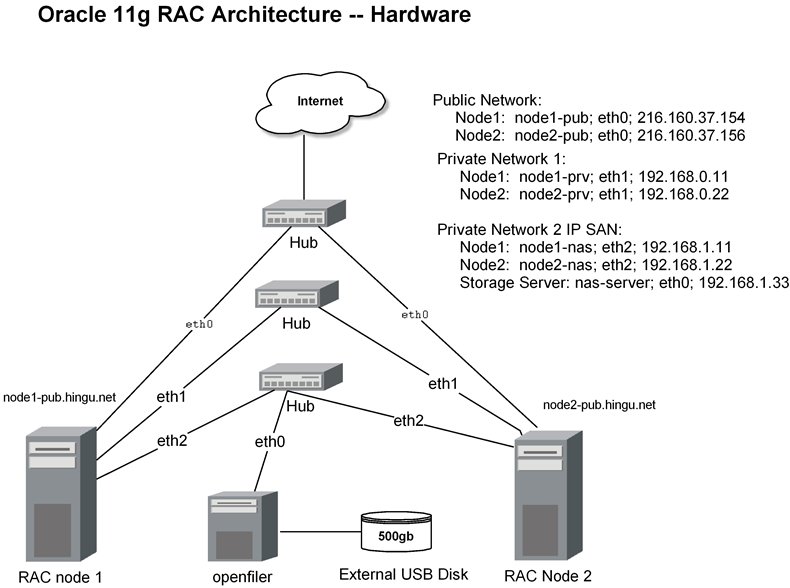
Public
Name:
node1-pub.hingu.net,
node2-pub.hingu.net
Private
Name:
node1-prv,
node2-prv
Virtual
Name:
node1-vip,
node2-vip
Operating System: CentOS Linux 4 Update 5 (2.6.9.4-55-EL)
ORACLE_BASE: /u01/app/oracle
ASM_BASE: /u01/app/asm
CRS_BASE: /u01/app/crs
CRS file Location: /u02/ocfs2 mounted on /dev/sda1 (ocfs)
Storage Server: nas-storage:
Oracle 11g R1 on CentOS EL 4 Update 5 requires
below extra packages to be installed with the version same or higher than
listed below.
binutils-2.15.92.0.2-18
compat-libstdc++-33.2.3-47.3
elfutils-libelf-0.97-5
elfutils-libelf-devel-0.97.5
glibc-2.3.9.4-2.19
glibc-common-2.3.9.4-2.19
glibc-devel-2.3.9.4-2.19
gcc-3.4.5-2
gcc-c++-3.4.5-2
libaio-devel-0.3.105-2
libaio-0.3.105-2
libgcc-3.4.5
libstdc++-3.4.5-2
libstdc++-devel-3.4.5-2
make-3.80-5
sysstat-5.0.5
unixODBC-2.2.11
unixODBC-devel-2.2.11
iscsi-initiator-utils-4.0.3.0-5 <-- For iscsi based SAN configuration
Below command checks
if these packages are installed or not. If not installed, then download and
install using YUM.
rpm -q binutils
elfutils-libelf elfutils-libelf-devel glibc glibc-common glibc-devel \
gcc gcc-c++ libaio libaio-devel libgcc
libstdc++ libstdc++-devel make \
compat-libstdc++ sysstat unixODBC
unixODBC-devel iscsi-initiator-utils
I
had to install the below rpms:
[root@node1-pub
~]# yum install libaio libaio-devel elfutils-libelf-devel unixODBC
unixODBC-devel
Configuring
Public and Private Network:
Each
node in the cluster must have 3 network adapter (eth0, eth1and eth2) one for
the public, second one for the private network interface (internodes
communication, interconnect) and third one for the Network Storage System
(Private). You make sure that if you configure eth1 as the private interface
for node1 then, eth1 must be configured as private interface for the node2.
Follow the below steps to configure these networks:
(1)
Change the hostname value by executing the below command:
For Node node1-pub:
[root@localhost ~]# hostname
node1-pub.hingu.net
For Node node2-pub:
[root@localhost ~]# hostname
node2-pub.hingu.net
For Storage Server:
[root@localhost ~]# hostname nas-server
(2)
Edit the /etc/hosts file as shown below:
[root@node2-pub ~]# cat /etc/hosts
# Do not remove the following line, or various programs
# that require network functionality will fail.
127.0.0.1
localhost.localdomain localhost
## Public Node names
216.160.37.154
node1-pub.hingu.net node1-pub
216.160.37.156
node2-pub.hingu.net node2-pub
## Private Network (Interconnect)
192.168.0.11
node1-prv
node1-prv
192.168.0.22
node2-prv
node2-prv
## Private Network (Network storage)
192.168.1.11
node1-nas
node1-nas
192.168.1.22
node2-nas
node2-nas
192.168.1.33
nas-server
nas-server
## Virtual IPs
216.160.37.153
node1-vip.hingu.net node1-vip
216.160.37.157
node2-vip.hingu.net node2-vip
(3)
Edit the /etc/sysconfig/network-scripts/ifcfg-eth0 as shown below:
[root@node2-pub ~]# cat
/etc/sysconfig/network-scripts/ifcfg-eth0
DEVICE=eth0
BOOTPROTO=none
IPADDR=216.160.37.154 <-- For Node 1
IPADDR=216.160.37.156 <-- For Node 2
HWADDR=00:06:5B:AE:AE:7F
ONBOOT=yes
TYPE=Ethernet
[root@node2-pub ~]#
(4)
Edit the /etc/sysconfig/network-scripts/ifcfg-eth1
as
shown below: -<-- For Cluster interconnects
Node node1-pub:
[root@node1-pub ~]# cat
/etc/sysconfig/network-scripts/ifcfg-eth1
DEVICE=eth1
BOOTPROTO=static
HWADDR=00:13:46:6A:FC:6D
ONBOOT=yes
IPADDR=192.168.0.11
NETMASK=255.255.255.0
TYPE=Ethernet
[root@node1-pub ~]#
Node node2-pub:
[root@node2-pub ~]# cat
/etc/sysconfig/network-scripts/ifcfg-eth1
DEVICE=eth1
BOOTPROTO=static
HWADDR=00:13:46:6A:FC:6D
ONBOOT=yes
IPADDR=192.168.0.22
NETMASK=255.255.255.0
TYPE=Ethernet
[root@node2-pub ~]#
(5)
Edit the /etc/sysconfig/network-scripts/ifcfg-eth2 on RAC Nodes as
shown below: <-- For iSCSI SAN Storage Network
Node node1-pub:
[root@node1-pub ~]# cat
/etc/sysconfig/network-scripts/ifcfg-eth2
# ADMtek NC100 Network Everywhere Fast Ethernet 10/100
DEVICE=eth2
ONBOOT=yes
BOOTPROTO=static
IPADDR=192.168.1.11
NETMASK=255.255.255.0
HWADDR=00:18:F8:0F:0D:C1
[root@node2-pub ~]#
Node node2-pub:
[root@node2-pub ~]# cat
/etc/sysconfig/network-scripts/ifcfg-eth2
# ADMtek NC100 Network Everywhere Fast Ethernet 10/100
DEVICE=eth2
ONBOOT=yes
BOOTPROTO=static
IPADDR=192.168.1.22
NETMASK=255.255.255.0
HWADDR=00:18:F8:0F:0D:C1
[root@node2-pub ~]#
Edit the /etc/sysconfig/network-scripts/ifcfg-eth0 on SAN/NAS Storage
Server:
[root@nas-server ~]# cat
/etc/sysconfig/network-scripts/ifcfg-eth0
DEVICE=eth0
BOOTPROTO=dhcp
HWADDR=00:80:AD:41:8C:1D
ONBOOT=yes
TYPE=Ethernet
[root@nas-server ~]#
(6)
Edit the /etc/sysconfig/network file with the below
contents:
Node node1-pub:
[root@node1-pub ~]# cat
/etc/sysconfig/network
NETWORKING=yes
HOSTNAME=node1-pub.hingu.net
Node node2-pub:
[root@node2-pub ~]# cat
/etc/sysconfig/network
NETWORKING=yes
HOSTNAME=node2-pub.hingu.net
(7)
Restart the network Service:
Restart the network services on all the nodes
for the above changes to take effect using service
network restart
command as root.
Downloading Oracle 11g Software:
Download the Oracle 11g R1 from here.
Oracle
11g R1 RAC requires minimum of 1GB RAM on each node to install 11g R1 RAC
successfully.
Oracle recommends that you set shared memory segment
attributes as well as semaphores to the following values.. I added the
following lines to /etc/sysctl.conf file. Every OS process needs semaphore
where It waits on for the resources. If the current value for any parameter is
higher than the value listed in this table, then do not change the value of
that parameter.
To see the current setting in the kernel, please use
the below command.
/sbin/sysctl -a | grep sem -- for semmsl, semmns,
semopm, semmni
/sbin/sysctl -a | grep shm -- for shmall,
shmmax, shmmni
/sbin/sysctl -a | grep file-max
/sbin/sysctl -a | grep ip_local_port_range
/sbin/sysctl -a | grep rmem_default
Please add/change the appropriate variables value in
the /etc/sysctl.conf file as shown below.
[root@node2-pub
~]# cat /etc/sysctl.conf
# Kernel sysctl configuration file for Red Hat Linux
#
# For binary values, 0 is disabled, 1 is enabled. See sysctl(8) and
# sysctl.conf(5) for more details.
# Controls IP packet forwarding
net.ipv4.ip_forward = 0
# Controls source route verification
net.ipv4.conf.default.rp_filter = 1
# Do not accept source routing
net.ipv4.conf.default.accept_source_route = 0
# Controls the System Request debugging functionality of the kernel
kernel.sysrq = 0
# Controls whether core dumps will append the PID to the core filename.
# Useful for debugging multi-threaded applications.
kernel.core_uses_pid = 1
# Extra parameters For 11g RAC installation
kernel.shmmax = 2147483648
kernel.shmmni = 4096
kernel.shmall = 2097152
kernel.sem = 250 32000 100 128
fs.file-max = 6553600
net.ipv4.ip_local_port_range = 1024 65000
net.core.rmem_default = 4194304
net.core.wmem_default = 262144
net.core.wmem_max= 262144
net.core.rmem_max = 4194304
After adding these lines to /etc/sysctl.conf, please
run the below command as root to make them enabled.
sysctl
-p
groupadd
-g 900 dba
groupadd
-g 901 oinstall
useradd -u 900 -g oinstall -G dba oracle
passwd oracle
Verify
that oracle user has same gid and uid on all the RAC nodes by executing the id
command
[root@node2-pub ~]# mkdir -p /u01/app/crs
[root@node2-pub ~]# mkdir -p /u01/app/asm
[root@node2-pub ~]# mkdir -p /u01/app/oracle
[root@node2-pub ~]# mkdir -p /u02/ocfs2
[root@node2-pub root]# chown -R oracle:oinstall /u01
[root@node2-pub root]# chown -R oracle:oinstall /u02
[root@node2-pub root]# chmod -R 775 /u01/app/oracle
[root@node2-pub root]# chmod -R
775 /u01
To improve the performance of the software on Linux systems, you must increase
the following shell limits
for the oracle user. Add the following lines to the /etc/security/limits.conf file:
oracle soft nproc 2047
oracle hard nproc 16384
oracle soft nofile 1024
oracle hard nofile 65536
Add or edit the following line in
the /etc/pam.d/login file, if it does not already exist:
session required
/lib/security/pam_limits.so
For the Bourne, Bash, or Korn
shell, add the following lines to the /etc/profile:
if [ $USER =
"oracle" ]; then
if [ $SHELL =
"/bin/ksh" ]; then
ulimit -p 16384
ulimit -n 65536
else
ulimit -u 16384
-n 65536
fi
fi
For the C shell (csh or tcsh),
add the following lines to the /etc/csh.login.
if ( $USER ==
"oracle" ) then
limit maxproc
16384
limit descriptors
65536
endif
To
configure SSH user equivalency, you must create RSA and DSA keys on each
cluster node and copy these keys
from all the cluster node members into an authorized key file on each node.
Follow the below steps to achieve this task.
su - oracle
mkdir ~/.ssh
chmod 700 ~/.ssh
(A)
Generate the RSA and DSA keys on Each NODE:
/usr/bin/ssh-keygen
-t rsa
/usr/bin/ssh-keygen -t dsa
(B)
on node1-pub:
Add
keys to the authorized key file and then send the same file to every nodes in
cluster:
touch
~/.ssh/authorized_keys
cd ~/.ssh
(1)
ssh
node1-pub cat /home/oracle/.ssh/id_rsa.pub >> authorized_keys
ssh node1-pub cat /home/oracle/.ssh/id_dsa.pub >> authorized_keys
ssh node2-pub cat /home/oracle/.ssh/id_rsa.pub >> authorized_keys
ssh node2-pub cat /home/oracle/.ssh/id_dsa.pub >> authorized_keys
(2)
[oracle@node1-pub
.ssh]$ scp authorized_keys node2-pub:/home/oracle/.ssh/
(C) ON Node2-pub:
(1)
ssh
node1-pub cat /home/oracle/.ssh/id_rsa.pub >> authorized_keys
ssh node1-pub cat /home/oracle/.ssh/id_dsa.pub >> authorized_keys
ssh node2-pub cat /home/oracle/.ssh/id_rsa.pub >> authorized_keys
ssh node2-pub cat /home/oracle/.ssh/id_dsa.pub >> authorized_keys
(2)
[oracle@node2-pub
.ssh]$ scp authorized_keys node1-pub:/home/oracle/.ssh/
(D)
Change the Permission of authorized_keys file (on each node)
[oracle@node2-pub .ssh]$ chmod 600 ~/.ssh/authorized_keys
During
executing step B - (1), you may be prompted as show below. Enter
"yes" and continue.
Now,
try executing the date (or any other command) on remote node to make sure that
oracle is not asked for the password. Do the same on both the nodes in cluster.
You should not receive any error message while you execute these commands on
all the nodes.
[oracle@node2-pub
oracle]$ ssh node1-prv date
Thu Sep 20 21:16:56 CDT 2007
[oracle@node2-pub oracle]$ ssh node2-prv date
Thu Sep 20 21:17:03 CDT 20075
[oracle@node2-pub oracle]$ ssh node1-pub date
Thu Sep 20 21:17:09 CDT 2007
[oracle@node2-pub oracle]$ ssh node2-pub date
Thu Sep 20 21:17:19 CDT 2007
Errors / Warnings during the network configurations:
I
got the below warning when I tried below command.
[oracle@node2-pub
.ssh]$ ssh node1-pub date
Warning: No xauth data; using fake authentication data for X11 forwarding.
Thu Sep 20 20:43:39 CDT 2007
To fix this, create the /home/oracle/.ssh/config file with the below
contents.
Host *
Forwardx11 no
You
may be prompted to enter 'yes' or 'no' for the first time performing ssh
commands. Simply enter 'yes' and continue. Afterwards, when oracle connects to
the remote node, it should not be asked for the password.
[oracle@node2-pub
oracle]$ ssh node1-prv date
The authenticity of host 'node1-prv (192.168.203.1)' can't be established.
RSA key fingerprint is <********************************************>
Are you sure you want to continue connecting (yes/no)? yes
Warning: Permanently added 'node1-prv,192.168.203.1' (RSA) to the list of known
hosts.
Sun Dec 18 20:01:09 CST 2005
[oracle@node2-pub oracle]$ ssh node1-prv date
Sun Dec 18 20:01:13 CST 2005
[oracle@node2-pub oracle]$
[oracle@node2-pub oracle]$ ssh node2-prv date
Warning: Permanently added the RSA host key for IP address '192.168.203.2' to
the list of known hosts.
Sun Dec 18 20:14:16 CST 2005
[oracle@node2-pub oracle]$ ssh node2-pub date
Sun Dec 18 20:15:05 CST 2005
You
may be prompted to enter 'yes' or 'no' for the first time performing ssh
commands. Simply ente'yes' and continue. Afterwards, when oracle connects to
the remote node, it should not be asked for the password.
If
you get then below error message when try to connect to remote node, please
make sure that the firewall is disabled on the remote node.
[root@node2-pub root]#
telnet node1-prv
Trying 192.168.203.1...
telnet: Unable to connect to remote host: No route to host
Configuring
System for Shared Disk Storage Device (iSCSI based IP SAN):
Every node in the cluster must have access to the shared
disk. So the shared disk must support the concurrent access to all nodes in
cluster in order to successfully build 11g R1 RAC. There are different types of
Storage Management softwares out there that allow you to build NAS/SAN. I have
chosen 'openfiler' because it is Linux 2.6 kernel based Storage Management OS
and it is powered by open source applications such as iSCSI. You can attach any type of external disks to
this server. You can then create volume groups on this device(s) and later
these volume groups are discovered as a new scsi devices on the RAC nodes.
Steps Involved to install/configure iSCSI based IP
SAN.
(1) Install openfiler OS
(2) Attach external disks to this server
I have attached the 500 GB WD USB (MyBook) hard drive. I planned to create 4
volumes for ASM file system each of 100GB and one for OCFS2, asm-dsk1,
asm-dsk2, asm-dsk3, asm-dsk4 and ocfs-dsk
ASM: DATA and FLASH disk groups for database files and
Flash Recovery Area files.
OCFS2: OCR, Voting Disks.
(3) Configure openfiler setup -- iscsi-target/volume
groups/shared access etc.
I have followed the above guide to configure the openfiler system and create
the volumes for ASM disks and OCFS disks.
Below are the sample screen shots for my openfiler setup.
The external disk is presented to the server as SCSI disks as shown below. In
my case it is /dev/sda. I have created physical volume on
this device and then created volume group rac11g on entire physical volume.
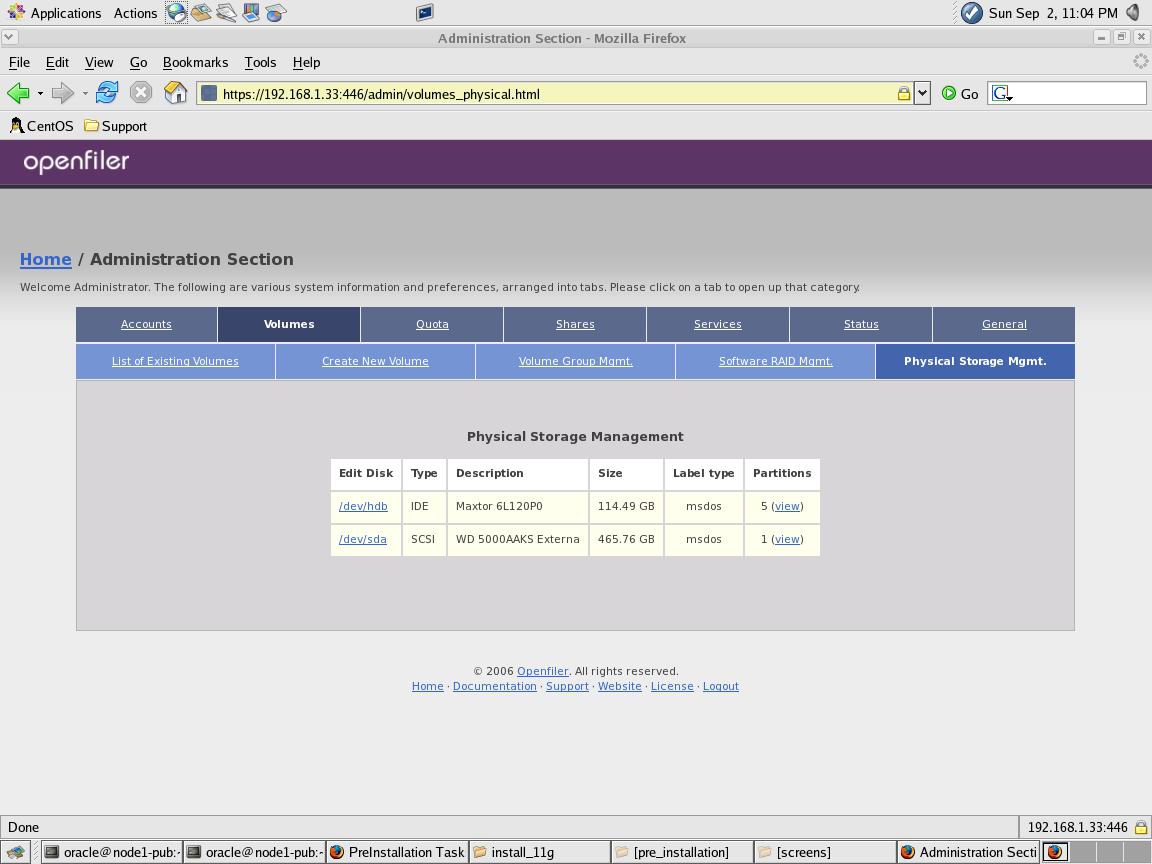
The below 5 volumes are created under the rac11g volume group.
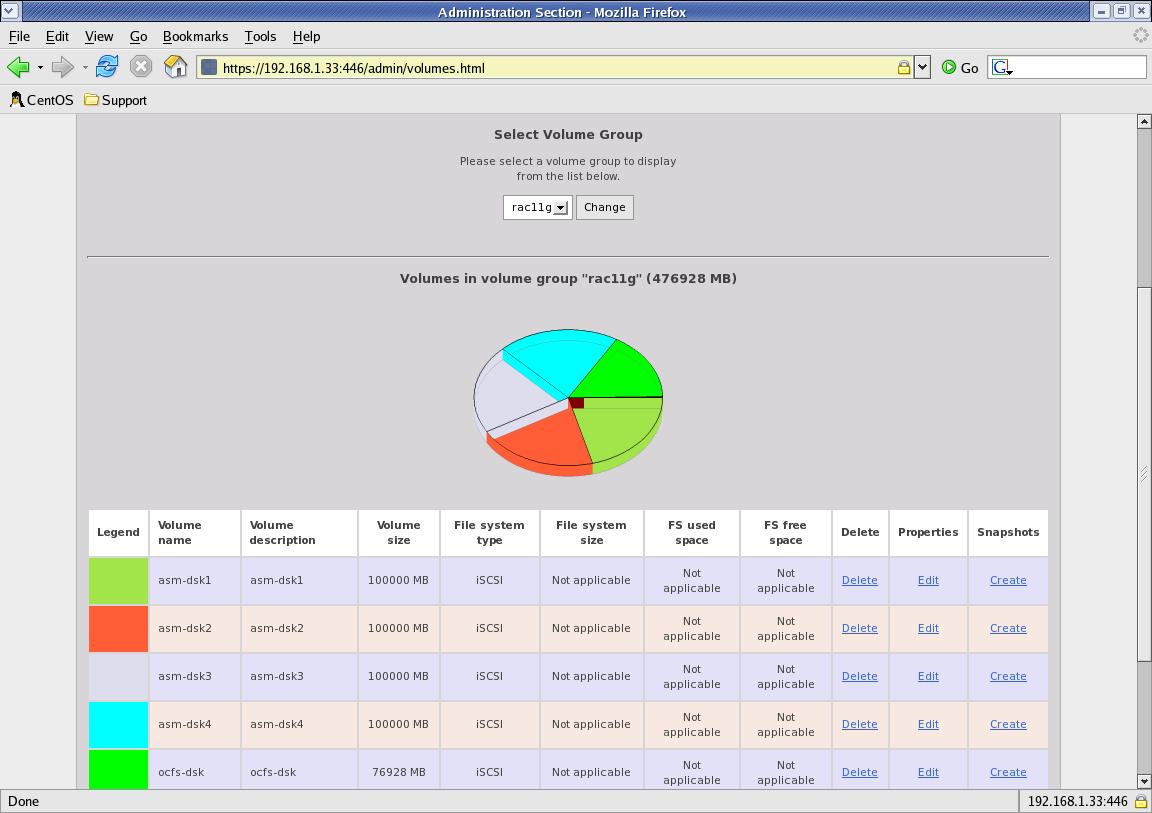
Also
make sure that each volume allows the shared access to all the nodes in the
cluster. You can do that by clicking the 'Edit' link on the above screen
for each volume name as shown below.
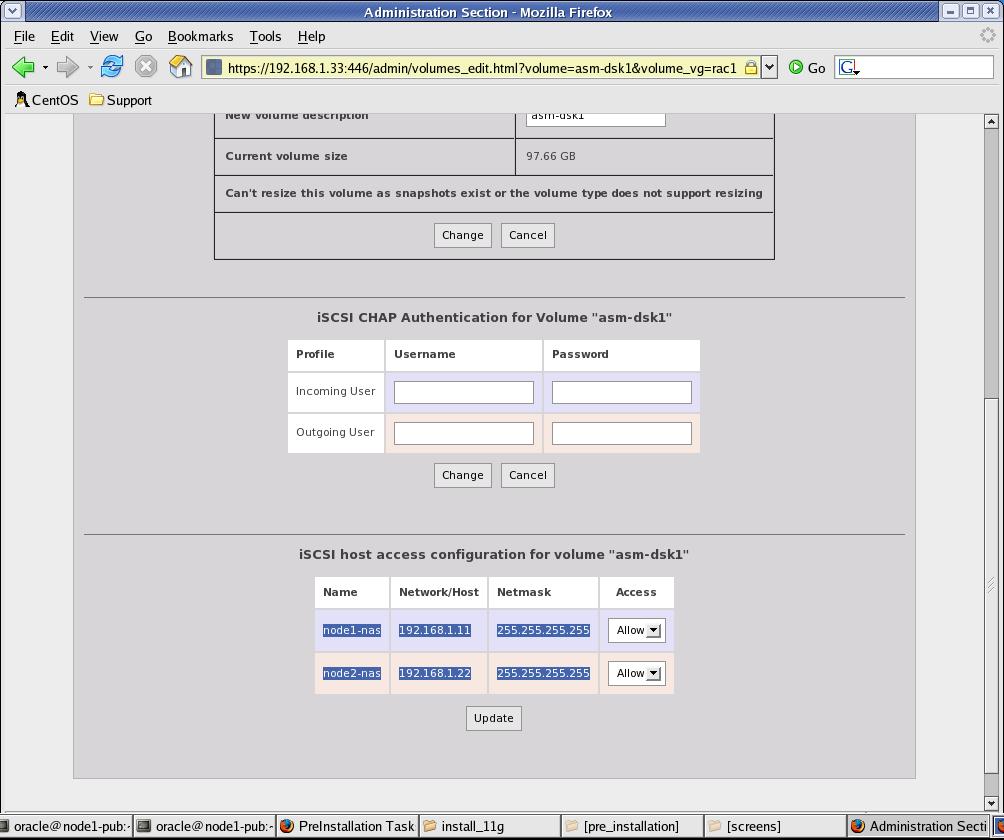
The
below screen shows that both the nodes in the cluster has shared access on the
storage. Click on the General tab to add/modify the rac nodes info. The network
information provided in this table are private network for the shared storage.
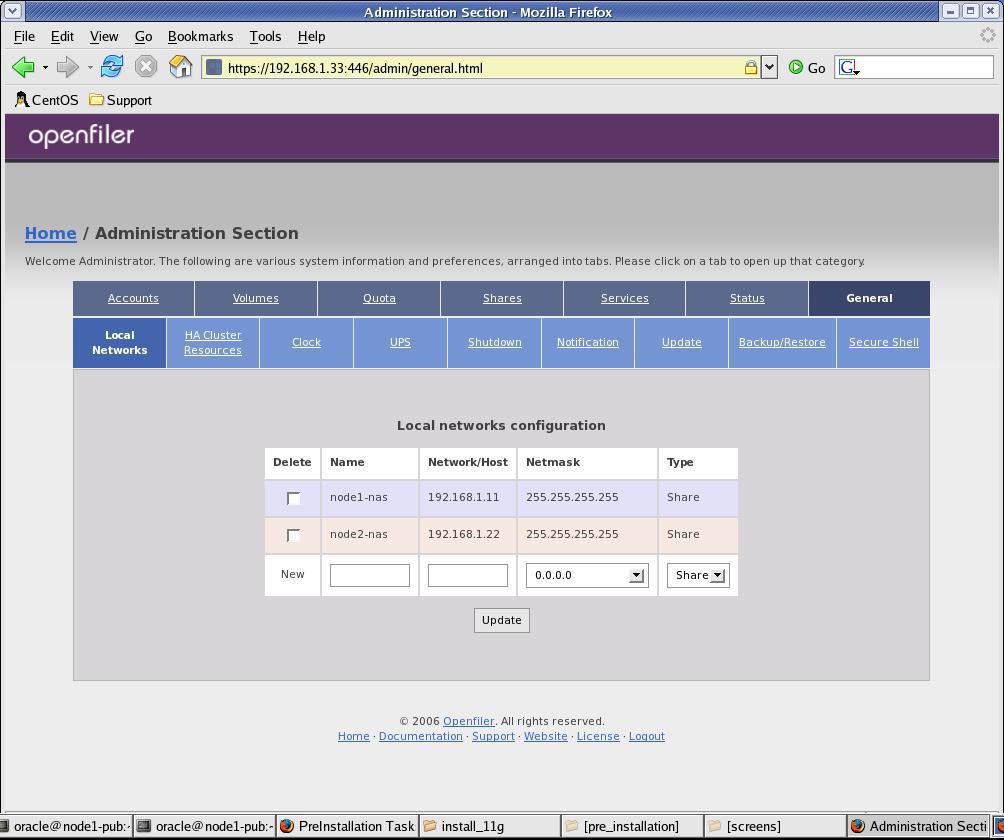
At
the End, make sure that iSCSI protocol is enabled in openfiler. You can enable
by clicking on the services tab.
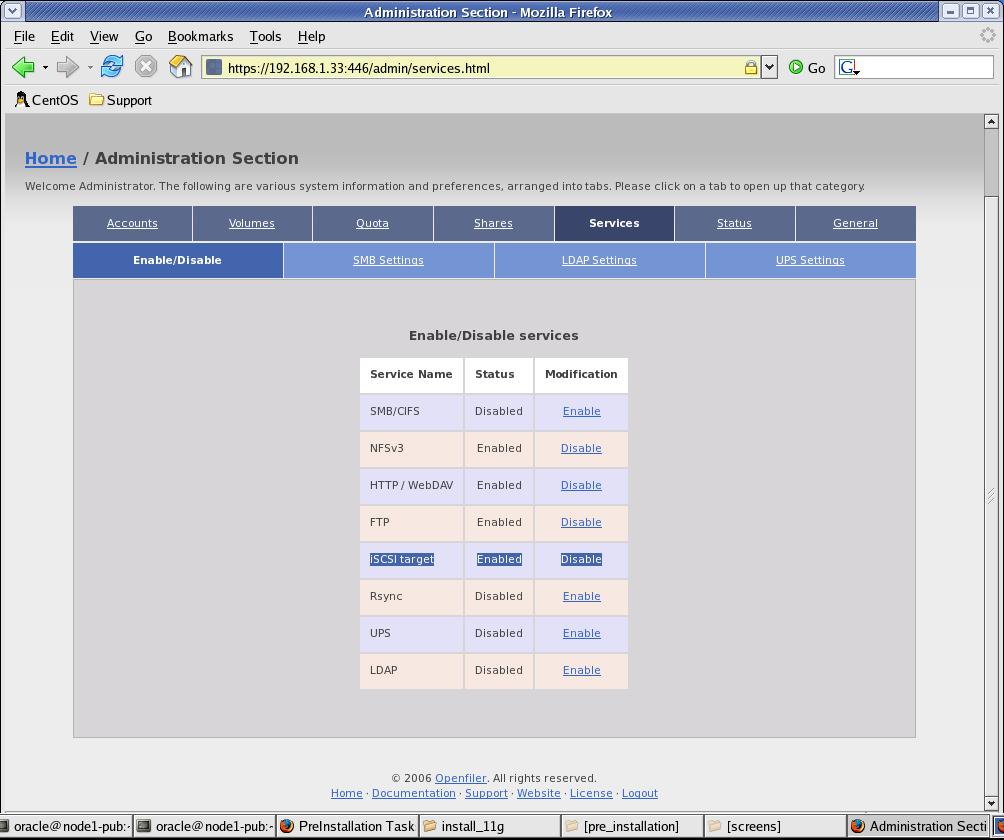
(4) Discovering the volumes to the RAC nodes as scsi devices
NOTE:
make sure that SELinux and firewall has been disabled on all the RAC nodes. If
not, then disable by "Administration Sections"
--> "system settings" --> "security Level"
Make Sure that the service iscsi-target is running on nas-server:
[root@nas-server ~]#
service iscsi-target status
ietd (pid 10688) is running...
[root@nas-server ~]#
on
all the RAC nodes:
Make
sure that the iscsi-initiator is installed on RAC nodes. If not, then download
the specified RPM and install them.
[root@node1-pub rpms]#
rpm -qa | grep iscsi
iscsi-initiator-utils-4.0.3.0-5
[root@node1-pub rpms]# service iscsi start -- if not already running
[root@node1-pub rpms]# service iscsi status
iscsid (pid 3256 3253) is running...
Configure
nodes for the Disk Discovery:
# --------------------------
# Discovery Address Category
# --------------------------
# To localize parameters to targets found on a particular discovery address
# (i.e., to override the global settings), you need to use the
# "DiscoveryAddress" setting. The format for the
"DiscoveryAddress" setting is
# a.b.c.d, a.b.c.d:e (where e is a TCP port number), or an instance name. An
# example of these settings would be:
#
#DiscoveryAddress=10.4.100.0
# or
#DiscoveryAddress=10.4.100.1:3260
# or
DiscoveryAddress=192.168.1.33 # <-- This is the address of the nas-server
#
(b)
Reboot All the Nodes and run the iscsi-ls command to see if the volumes have
been discovered on the RAC nodes as scsi devices.
(c)
[root@node2-pub rpms]# iscsi-ls
*******************************************************************************
SFNet iSCSI Driver Version ...4:0.1.11-4(15-Jan-2007)
*******************************************************************************
TARGET
NAME :
iqn.2006-01.com.openfiler:rac11g.ocfs-dsk
TARGET ALIAS
:
HOST
ID
: 0
BUS
ID
: 0
TARGET
ID
: 0
TARGET ADDRESS :
192.168.1.33:3260,1
SESSION STATUS :
ESTABLISHED AT Sun Sep 2 18:49:57 CDT 2007
SESSION
ID
: ISID 00023d000001 TSIH 1200
*******************************************************************************
TARGET
NAME :
iqn.2006-01.com.openfiler:rac11g.asm-dsk4
TARGET ALIAS
:
HOST ID
: 1
BUS
ID
: 0
TARGET
ID
: 0
TARGET ADDRESS :
192.168.1.33:3260,1
SESSION STATUS :
ESTABLISHED AT Sun Sep 2 18:49:57 CDT 2007
SESSION
ID
: ISID 00023d000001 TSIH 1000
*******************************************************************************
TARGET
NAME :
iqn.2006-01.com.openfiler:rac11g.asm-dsk3
TARGET ALIAS
:
HOST
ID
: 2
BUS
ID
: 0
TARGET
ID
: 0
TARGET ADDRESS :
192.168.1.33:3260,1
SESSION STATUS :
ESTABLISHED AT Sun Sep 2 18:49:57 CDT 2007
SESSION
ID
: ISID 00023d000001 TSIH 1100
*******************************************************************************
TARGET NAME
: iqn.2006-01.com.openfiler:rac11g.asm-dsk2
TARGET ALIAS
:
HOST
ID
: 3
BUS
ID
: 0
TARGET
ID
: 0
TARGET ADDRESS :
192.168.1.33:3260,1
SESSION STATUS :
ESTABLISHED AT Sun Sep 2 18:49:57 CDT 2007
SESSION
ID
: ISID 00023d000001 TSIH 1300
*******************************************************************************
TARGET
NAME :
iqn.2006-01.com.openfiler:rac11g.asm-dsk1
TARGET ALIAS
:
HOST
ID
: 4
BUS
ID
: 0
TARGET
ID
: 0
TARGET ADDRESS :
192.168.1.33:3260,1
SESSION STATUS :
ESTABLISHED AT Sun Sep 2 18:49:58 CDT 2007
SESSION
ID
: ISID 00023d000001 TSIH 1400
*******************************************************************************
[root@node2-pub rpms]#
(4) Map the Volumes on the iscsi-target (nas-server) to the Disks disceverd on
the local RAC nodes.
Host ID Target ID
discovered as
0
iqn.2006-01.com.openfiler:rac11g.ocfs-dsk
---
1
iqn.2006-01.com.openfiler:rac11g.asm-dsk4
---
2
iqn.2006-01.com.openfiler:rac11g.asm-dsk3
---
3
iqn.2006-01.com.openfiler:rac11g.asm-dsk2
---
Now, run the below command to find out the "Attached" devices to the
Host IDs. The scsi Id in this output maps to the Host ID on the
"iscsi-ls" output.
[root@node2-pub rpms]# dmesg | grep Attached
Attached scsi disk sda at scsi0, channel 0, id 0, lun 0
Attached scsi disk sdb at scsi1, channel 0, id 0, lun 0
Attached scsi disk sdc at scsi2, channel 0, id 0, lun 0
Attached scsi disk sdd at scsi3, channel 0, id 0, lun 0
Attached scsi disk sde at scsi4, channel 0, id 0, lun 0
In first line, scsi0 (Host Id 0) has device "sda" attached to it. So,
by filling the above table
Host ID
Target ID
Volume Name discovered as
0 iqn.2006-01.com.openfiler:rac11g.ocfs-dsk
ocfs-dsk sda
1
iqn.2006-01.com.openfiler:rac11g.asm-dsk4 asm-dsk4
sdb
2
iqn.2006-01.com.openfiler:rac11g.asm-dsk3 asm-dks3
sdc
3 iqn.2006-01.com.openfiler:rac11g.asm-dsk2
asm-dsk2 sdd
4
iqn.2006-01.com.openfiler:rac11g.asm-dsk1
asm-dsk1 sde
I
am going to have 4 disks assigned to ASM and one for OCFS. So, I have created a
single partition on these 5 disks. Create partitions from ONLY one of the
available RAC nodes. This can be any node in cluster.
[root@node1-pub ~]#
fdisk -l
Disk /dev/hda: 160.0 GB, 160041885696 bytes
255 heads, 63 sectors/track, 19457 cylinders
Units = cylinders of 16065 * 512 = 8225280 bytes
Device Boot
Start
End Blocks Id System
/dev/hda1
*
1
13 104391 83 Linux
/dev/hda2
14 19457 156183930
8e Linux LVM
Disk /dev/sda: 80.6 GB, 80664854528 bytes
255 heads, 63 sectors/track, 9806 cylinders
Units = cylinders of 16065 * 512 = 8225280 bytes
Disk /dev/sda doesn't contain a valid partition table
Disk /dev/sdb: 104.8 GB, 104857600000 bytes
255 heads, 63 sectors/track, 12748 cylinders
Units = cylinders of 16065 * 512 = 8225280 bytes
Disk /dev/sdb doesn't contain a valid partition table
Disk /dev/sdc: 104.8 GB, 104857600000 bytes
255 heads, 63 sectors/track, 12748 cylinders
Units = cylinders of 16065 * 512 = 8225280 bytes
Disk /dev/sdc doesn't contain a valid partition table
Disk /dev/sdd: 104.8 GB, 104857600000 bytes
255 heads, 63 sectors/track, 12748 cylinders
Units = cylinders of 16065 * 512 = 8225280 bytes
Disk /dev/sdd doesn't contain a valid partition table
Disk /dev/sde: 104.8 GB, 104857600000 bytes
255 heads, 63 sectors/track, 12748 cylinders
Units = cylinders of 16065 * 512 = 8225280 bytes
Disk /dev/sde doesn't contain a valid partition table
----==========Create partitions================
[root@node1-pub ~]# fdisk /dev/sda
Device contains neither a valid DOS partition table, nor Sun, SGI or OSF
disklabel
Building a new DOS disklabel. Changes will remain in memory only,
until you decide to write them. After that, of course, the previous
content won't be recoverable.
The number of cylinders for this disk is set to 9806.
There is nothing wrong with that, but this is larger than 1024,
and could in certain setups cause problems with:
1) software that runs at boot time (e.g., old versions of LILO)
2) booting and partitioning software from other
(e.g., DOS FDISK, OS/2 FDISK)
Warning: invalid flag 0x0000 of partition table 4 will be corrected by w(rite)
Command (m for help): n
Command action
e extended
p primary partition (1-4)
p
Partition number (1-4): 1
First cylinder (1-9806, default 1):
Using default value 1
Last cylinder or +size or +sizeM or +sizeK (1-9806, default 9806):
Using default value 9806
Command (m for help): w
The partition table has been altered!
Calling ioctl() to re-read partition table.
Syncing disks.
[root@node1-pub ~]# fdisk /dev/sdb
Device contains neither a valid DOS partition table, nor Sun, SGI or OSF
disklabel
Building a new DOS disklabel. Changes will remain in memory only,
until you decide to write them. After that, of course, the previous
content won't be recoverable.
The number of cylinders for this disk is set to 12748.
There is nothing wrong with that, but this is larger than 1024,
and could in certain setups cause problems with:
1) software that runs at boot time (e.g., old versions of LILO)
2) booting and partitioning software from other
(e.g., DOS FDISK, OS/2 FDISK)
Warning: invalid flag 0x0000 of partition table 4 will be corrected by w(rite)
Command (m for help): n
Command action
e extended
p primary partition (1-4)
p
Partition number (1-4): 1
First cylinder (1-12748, default 1):
Using default value 1
Last cylinder or +size or +sizeM or +sizeK (1-12748, default 12748):
Using default value 12748
Command (m for help): w
The partition table has been altered!
Calling ioctl() to re-read partition table.
Syncing disks.
[root@node1-pub ~]# fdisk /dev/sdc
Device contains neither a valid DOS partition table, nor Sun, SGI or OSF
disklabel
Building a new DOS disklabel. Changes will remain in memory only,
until you decide to write them. After that, of course, the previous
content won't be recoverable.
The number of cylinders for this disk is set to 12748.
There is nothing wrong with that, but this is larger than 1024,
and could in certain setups cause problems with:
1) software that runs at boot time (e.g., old versions of LILO)
2) booting and partitioning software from other
(e.g., DOS FDISK, OS/2 FDISK)
Warning: invalid flag 0x0000 of partition table 4 will be corrected by w(rite)
Command (m for help): n
Command action
e extended
p primary partition (1-4)
p
Partition number (1-4): 1
First cylinder (1-12748, default 1):
Using default value 1
Last cylinder or +size or +sizeM or +sizeK (1-12748, default 12748):
Using default value 12748
Command (m for help): p
Disk /dev/sdc: 104.8 GB, 104857600000 bytes
255 heads, 63 sectors/track, 12748 cylinders
Units = cylinders of 16065 * 512 = 8225280 bytes
Device Boot
Start
End Blocks Id System
/dev/sdc1
1 12748 102398278+
83 Linux
Command (m for help): w
The partition table has been altered!
Calling ioctl() to re-read partition table.
Syncing disks.
[root@node1-pub ~]# fdisk /dev/sdd
Device contains neither a valid DOS partition table, nor Sun, SGI or OSF
disklabel
Building a new DOS disklabel. Changes will remain in memory only,
until you decide to write them. After that, of course, the previous
content won't be recoverable.
The number of cylinders for this disk is set to 12748.
There is nothing wrong with that, but this is larger than 1024,
and could in certain setups cause problems with:
1) software that runs at boot time (e.g., old versions of LILO)
2) booting and partitioning software from other
(e.g., DOS FDISK, OS/2 FDISK)
Warning: invalid flag 0x0000 of partition table 4 will be corrected by w(rite)
Command (m for help): n
Command action
e extended
p primary partition (1-4)
p
Partition number (1-4): 1
First cylinder (1-12748, default 1):
Using default value 1
Last cylinder or +size or +sizeM or +sizeK (1-12748, default 12748):
Using default value 12748
Command (m for help): p
Disk /dev/sdd: 104.8 GB, 104857600000 bytes
255 heads, 63 sectors/track, 12748 cylinders
Units = cylinders of 16065 * 512 = 8225280 bytes
Device Boot Start
End Blocks Id System
/dev/sdd1
1 12748 102398278+
83 Linux
Command (m for help): w
The partition table has been altered!
Calling ioctl() to re-read partition table.
Syncing disks.
[root@node1-pub ~]# fdisk /dev/sde
Device contains neither a valid DOS partition table, nor Sun, SGI or OSF
disklabel
Building a new DOS disklabel. Changes will remain in memory only,
until you decide to write them. After that, of course, the previous
content won't be recoverable.
The number of cylinders for this disk is set to 12748.
There is nothing wrong with that, but this is larger than 1024,
and could in certain setups cause problems with:
1) software that runs at boot time (e.g., old versions of LILO)
2) booting and partitioning software from other
(e.g., DOS FDISK, OS/2 FDISK)
Warning: invalid flag 0x0000 of partition table 4 will be corrected by w(rite)
Command (m for help): n
Command action
e extended
p primary partition (1-4)
p
Partition number (1-4): 1
First cylinder (1-12748, default 1):
Using default value 1
Last cylinder or +size or +sizeM or +sizeK (1-12748, default 12748):
Using default value 12748
Command (m for help): p
Disk /dev/sde: 104.8 GB, 104857600000 bytes
255 heads, 63 sectors/track, 12748 cylinders
Units = cylinders of 16065 * 512 = 8225280 bytes
Device Boot
Start
End Blocks Id System
/dev/sde1
1 12748 102398278+
83 Linux
Command (m for help): w
The partition table has been altered!
Calling ioctl() to re-read partition table.
Syncing disks.
[root@node1-pub ~]#
Listing the Partitions:
[root@node1-pub ~]# fdisk -l
Disk /dev/hda: 160.0 GB, 160041885696
bytes
255 heads, 63 sectors/track, 19457
cylinders
Units = cylinders of 16065 * 512 =
8225280 bytes
Device
Boot
Start
End Blocks Id System
/dev/hda1
*
1
13 104391 83 Linux
/dev/hda2
14 19457 156183930
8e Linux LVM
Disk /dev/sda: 80.6 GB, 80664854528
bytes
255 heads, 63 sectors/track, 9806
cylinders
Units = cylinders of 16065 * 512 =
8225280 bytes
Device
Boot
Start
End Blocks Id System
/dev/sda1
1 9806
78766663+ 83 Linux
Disk /dev/sdb: 104.8 GB, 104857600000
bytes
255 heads, 63 sectors/track, 12748
cylinders
Units = cylinders of 16065 * 512 =
8225280 bytes
Device
Boot
Start
End Blocks Id System
/dev/sdb1
1 12748 102398278+
83 Linux
Disk /dev/sdc: 104.8 GB, 104857600000
bytes
255 heads, 63 sectors/track, 12748
cylinders
Units = cylinders of 16065 * 512 =
8225280 bytes
Device
Boot
Start End
Blocks Id System
/dev/sdc1
1 12748 102398278+
83 Linux
Disk /dev/sdd: 104.8 GB, 104857600000
bytes
255 heads, 63 sectors/track, 12748
cylinders
Units = cylinders of 16065 * 512 =
8225280 bytes
Device
Boot Start
End Blocks
Id System
/dev/sdd1
1 12748 102398278+
83 Linux
Disk /dev/sde: 104.8 GB, 104857600000
bytes
255 heads, 63 sectors/track, 12748
cylinders
Units = cylinders of 16065 * 512 =
8225280 bytes
Device
Boot
Start
End Blocks Id System
/dev/sde1
1 12748 102398278+
83 Linux
[root@node1-pub ~]#
Issues and Problems in openfiler Configuration:
1. Devices disappear after reboot of Openfiler Server (nas-server):
I
have seen that the iscsi devices no longer available on rac nodes after reboot
of nas-server (Openfiler). This is most likely because the volume groups are
not scanned after the reboot on Openfiler server. I have included the necessary
commands to scan and activate these volume groups after every reboot of
openfiler server into the startup script (/etc/rc.local).
Also make sure that firewall and SELinux is disabled on all the machines in
configurations.
SOLUTION: I have Followed the below steps resolves the mentioned issue in my
case.
- stop the
iscsi-target on nas-server as root -- service iscsi-target stop
- Scan the
systems for the volume groups as root -- vgscan
- Activate
the volumes as root -- vgchange -ay
- start
the iscsi-target on nas-server as root -- service iscsi-target start
- confirm
that volumegroups are available as root -- lvdisplay
- On the
client machines (rac nodes), restart the iscsi service as root -- service
iscsi restart
- Confirm
that the iscsi devices are available as root -- iscsi-ls
In
/etc/rc.local on nas-server (openfiler) add
below lines:
vgscan
vgchange -ay
service iscsi-target restart
In
/etc/rc.local on each node (rac nodes) add
below line:
service iscsi restart
2. Device name not persistent after reboot of RAC nodes (node1-pub,
node2-pub):
I
have seen that the iscsi device names are changed after reboot of rac nodes.
For e.g, device /dev/sda1 now becomes /dev/sdb1
after reboot. This behavior has caused very serious issues for the OCR and Vote
disks as well as the disks formatted with ocfs2 devices. They don't get mounted
automatically because they are not persistent after reboot. While
goggling on how to overcome this issue on CentOS 4, I came across an utility
called "devlabel" that are developed by Dell Inc and it is available
to download free from Dell's Official Website. This utility creates the symlink
to the device names by considering physical devices' UUID. So, even after the
reboot, the UUID for any devices stays at it is and so the symlink that you
create using devlabel always points to the UUID of the device.
NOTE: You do not need to create symlink using devlabel for the devices that you
are going to use for ASM disks.
(1)
Download
the latest rpm of devlabel from Dell's
website and Install it on all the RAC nodes.
[root@node1-pub
Desktop]# rpm -ivh devlabel-0.48.01-1.i386.rpm
warning: devlabel-0.48.01-1.i386.rpm: V3 DSA signature: NOKEY, key ID 23b66a9d
Preparing...
########################################### [100%]
1:devlabel
########################################### [100%]
[root@node1-pub Desktop]#
(2) Create the SYMLINK
using the devlabel (All the RAC nodes):
(a) Get the Host ID and the
Devices attached to that ID by below command:
[root@node1-pub ~]#
dmesg | grep Attached
Attached scsi disk sda at scsi5, channel 0, id 0, lun 0
Attached scsi disk sdb at scsi8, channel 0, id 0, lun 0
Attached scsi disk sdc at scsi6, channel 0, id 0, lun 0
Attached scsi disk sdd at scsi9, channel 0, id 0, lun 0
Attached scsi disk sde at scsi7, channel 0, id 0, lun 0
(b) Get the Target Name
associated to each Host ID by below command:
[root@node1-pub ~]#
iscsi-ls
*******************************************************************************
SFNet iSCSI Driver Version ...4:0.1.11-4(15-Jan-2007)
*******************************************************************************
TARGET
NAME :
iqn.2006-01.com.openfiler:rac11g.ocfs-dsk
TARGET ALIAS
:
HOST
ID
: 5
BUS
ID
: 0
TARGET
ID
: 0
TARGET ADDRESS :
192.168.1.33:3260,1
SESSION STATUS :
ESTABLISHED AT Fri Sep 28 16:27:45 CDT 2007
SESSION
ID
: ISID 00023d000001 TSIH 1a00
*******************************************************************************
TARGET
NAME :
iqn.2006-01.com.openfiler:rac11g.asm-dsk4
TARGET ALIAS
:
HOST
ID
: 6
BUS
ID
: 0
TARGET ID
: 0
TARGET ADDRESS :
192.168.1.33:3260,1
SESSION STATUS :
ESTABLISHED AT Fri Sep 28 16:27:46 CDT 2007
SESSION
ID
: ISID 00023d000001 TSIH 1b00
*******************************************************************************
TARGET
NAME :
iqn.2006-01.com.openfiler:rac11g.asm-dsk3
TARGET ALIAS
:
HOST
ID
: 7
BUS
ID
: 0
TARGET
ID
: 0
TARGET ADDRESS :
192.168.1.33:3260,1
SESSION STATUS : ESTABLISHED
AT Fri Sep 28 16:27:46 CDT 2007
SESSION
ID
: ISID 00023d000001 TSIH 1e00
*******************************************************************************
TARGET
NAME :
iqn.2006-01.com.openfiler:rac11g.asm-dsk2
TARGET ALIAS
:
HOST
ID
: 8
BUS
ID
: 0
TARGET
ID
: 0
TARGET ADDRESS :
192.168.1.33:3260,1
SESSION STATUS :
ESTABLISHED AT Fri Sep 28 16:27:45 CDT 2007
SESSION
ID
: ISID 00023d000001 TSIH 1c00
*******************************************************************************
TARGET
NAME :
iqn.2006-01.com.openfiler:rac11g.asm-dsk1
TARGET ALIAS
:
HOST
ID
: 9
BUS
ID
: 0
TARGET ID
: 0
TARGET ADDRESS :
192.168.1.33:3260,1
SESSION STATUS :
ESTABLISHED AT Fri Sep 28 16:27:46 CDT 2007
SESSION
ID
: ISID 00023d000001 TSIH 1d00
*******************************************************************************
(c) Create SYMLINK using below command:
[root@node1-pub ~]#
devlabel add -d /dev/sdc1 -s /dev/ocfs2
SYMLINK: /dev/ocfs2 -> /dev/sde1
Added /dev/ocfs2 to /etc/sysconfig/devlabel
[root@node1-pub ~]#
[root@node1-pub ~]# devlabel add -d /dev/sde1 -s /dev/asmdsk4
SYMLINK: /dev/asmdsk4 -> /dev/sde1
Added /dev/asmdsk4 to /etc/sysconfig/devlabel
[root@node1-pub ~]#
[root@node1-pub ~]# devlabel add -d /dev/sde1 -s /dev/asmdsk3
SYMLINK: /dev/asmdsk3 -> /dev/sde1
Added /dev/asmdsk3 to /etc/sysconfig/devlabel
[root@node1-pub ~]#
[root@node1-pub ~]# devlabel add -d /dev/sdb1 -s /dev/asmdsk2
SYMLINK: /dev/asmdsk2 -> /dev/sdb1
[root@node1-pub ~]#
Added /dev/asmdsk2 to /etc/sysconfig/devlabel
[root@node1-pub ~]# devlabel add -d /dev/sdd1 -s /dev/asmdsk1
SYMLINK: /dev/asmdsk1 -> /dev/sdd1
[root@node1-pub ~]#
Added /dev/asmdsk1 to /etc/sysconfig/devlabel
[root@node1-pub ~]#
(d)
Confirm
that the symlinks are associated with the UUID of each physical devices (All
RAC Nodes)
[root@node1-pub ~]#
cat /etc/sysconfig/devlabel
# devlabel configuration file
#
# This file should generally not be edited by hand.
# Instead, use the /sbin/devlabel program to make changes.
# devlabel by Gary Lerhaupt <gary_lerhaupt@dell.com>
#
# format: <SYMLINK> <DEVICE> <UUID>
# or format: <RAWDEVICE> <DEVICE> <UUID>
/dev/ocfs2 /dev/sda1
S83.1:4f70656e66696c000000000005000000b92700000e000000OpenfileVirtualdisksector63-157533389
/dev/asmdsk4 /dev/sdc1
S83.1:4f70656e66696c000000000004000000a52700000e000000OpenfileVirtualdisksector63-204796619
/dev/asmdsk3 /dev/sde1
S83.1:4f70656e66696c000000000003000000912700000e000000OpenfileVirtualdisksector63-204796619
/dev/asmdsk2 /dev/sdb1
S83.1:4f70656e66696c0000000000020000007d2700000e000000OpenfileVirtualdisksector63-204796619
/dev/asmdsk1 /dev/sdd1 S83.1:4f70656e66696c000000000001000000672700000e000000OpenfileVirtualdisksector63-204796619
(e)
Mount
the ocfs2 devices under the appropriate mount point and update the /etc/fstab
(in my case it is /u02/ocfs2):
[root@node1-pub ~]#
mount -t ocfs2 -o datavolume,nointr /dev/ocfs2 /u02/ocfs2
[root@node1-pub ~]# vi /etc/fstab
[root@node1-pub ~]# cat /etc/fstab
# This file is edited by fstab-sync - see 'man fstab-sync' for details
/dev/VolGroup00/LogVol00
/
ext3 defaults 1 1
LABEL=/boot
/boot
ext3 defaults 1 2
none
/dev/pts
devpts gid=5,mode=620 0 0
none
/dev/shm
tmpfs defaults 0 0
none
/proc
proc defaults 0 0
none
/sys
sysfs defaults 0 0
/dev/VolGroup00/LogVol01
swap
swap defaults 0 0
## OCFS2 mountpoint
/dev/ocfs2
/u02/ocfs2
ocfs2 _netdev,datavolume,nointr 0 0
/dev/hdc
/media/cdrom
auto pamconsole,exec,noauto,managed 0 0
/dev/fd0
/media/floppy
auto pamconsole,exec,noauto,managed 0 0
(f)
Update
the /etc/rc.local files (All RAC nodes):
I have seen that after reboot of RAC nodes, the devlabel does not get started
automatically and so the ocfs2 mountpoint gets failed because there is no
SYMLINK named /dev/ocfs2 in the kernel that points to ocfs2 disk. So, I have to
reload the SYMLINKs
and mount the ocfs2 device manually after the reboot. as shown below:
[root@node1-pub
~]# devlabel reload
SYMLINK: /dev/ocfs2 -> /dev/sda1
SYMLINK: /dev/asmdsk4 -> /dev/sdb1
SYMLINK: /dev/asmdsk3 -> /dev/sdc1
SYMLINK: /dev/asmdsk2 -> /dev/sdd1
SYMLINK: /dev/asmdsk1 -> /dev/sde1
To
avoid manual intervention, I added the below entries into start up scripts /etc/rc.local file.
The below is the sample output of my /etc/rc.local
# Affirms the mappings of symlinks
to storage devices. If a
# device cannot be found by its UUID, the existing symlink will
# be deleted. If the device name has changed, it will update the
# symlink. Both start and restart are synonyms for this command.
service iscsi restart
devlabel reload
mount -t ocfs2 -o datavolume,nointr /dev/ocfs2 /u02/ocfs2
Installing and Configuring
OCFS2 (Oracle Cluster File System):
I have followed the OCFS2 setup guide
to install and configure the OCFS2.
Download and Install the required rpms:
Please
download the below rpms from Oracle's website and install them as shown.
ocfs2-2.6.9-55.0.2.EL-1.2.5-6.i686.rpm
ocfs2-tools-1.2.4-1.i386.rpm
ocfs2-tools-debuginfo-1.2.4-1.i386.rpm
ocfs2-tools-devel-1.2.4-1.i386.rpm
[root@node1-pub rpms]# rpm -ivh
ocfs2-2.6.9-55.0.2.EL-1.2.5-6.i686.rpm \
> ocfs2-tools-1.2.4-1.i386.rpm \
> ocfs2console-1.2.4-1.i386.rpm \
> ocfs2-tools-debuginfo-1.2.4-1.i386.rpm \
> ocfs2-tools-devel-1.2.4-1.i386.rpm
Preparing...
########################################### [100%]
1:ocfs2-tools
########################################### [ 20%]
2:ocfs2-2.6.9-55.0.2.EL
########################################### [ 40%]
3:ocfs2console
########################################### [ 60%]
4:ocfs2-tools-debuginfo
########################################### [ 80%]
5:ocfs2-tools-devel ###########################################
[100%]
[root@node1-pub rpms]#
Running ocfs2console command line utility brings this screen.
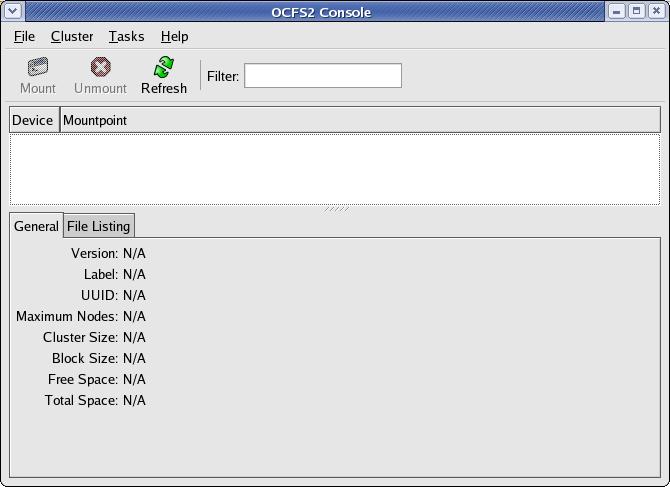
You
can close this box as you can enable the o2cb service later.
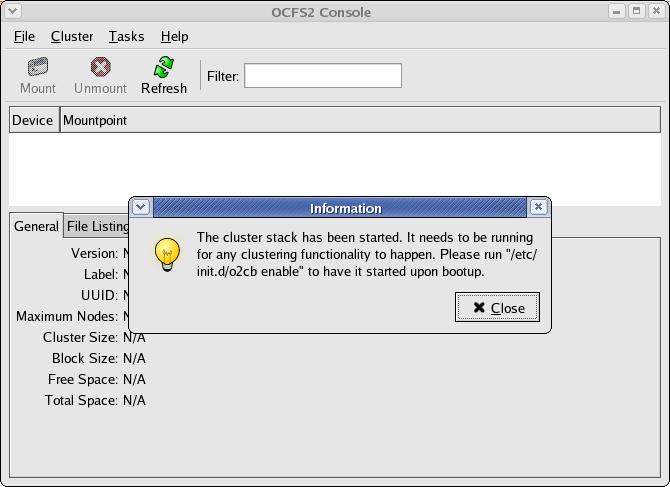
Click
Cluster --> Configure Nodes. Add node names for each node one-by-one.
Make sure to add exact same node name as it has been returned by the `hostname`
command.
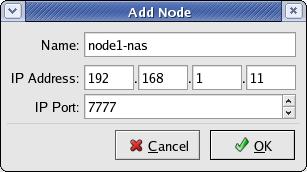
My
host name names are node1-pub.hingu.net and node2-pub.hingu.net for node 1 and
node 2 respectively.
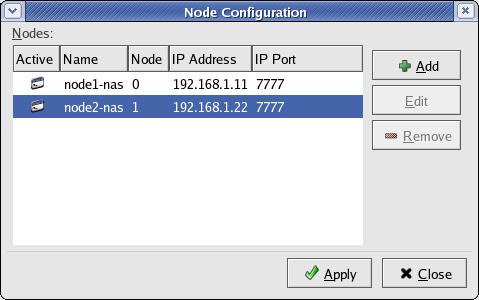
Propagate
the files to all the nodes in cluster:
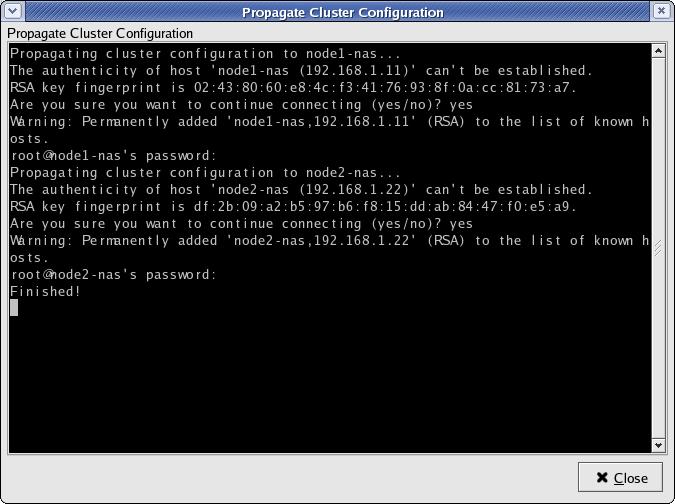
So,
the above settings of "Name" (node1-nas and node2-nas) in the ocfs2
configuration will lead to below error when I try to enable o2cb service.
Writing O2CB configuration: OK
Starting O2CB cluster ocfs2: Failed
Cluster ocfs2 created
Node node1-nas added
Node node2-nas added
o2cb_ctl: Configuration error discovered while populating cluster ocfs2.
None of its nodes were considered local. A node is considered local when
its node name in the configuration matches this machine's host name.
Stopping O2CB cluster ocfs2: OK
[root@node1-pub rpms]#
So,
stop o2cb service, open the /etc/ocfs2/cluster.conf file and update the
hostname value to the one that is returned by `hostname` command.
Do not update the IP. Start the service and load it again and the error
should go away.
[oracle@node2-pub ~]$ cat /etc/ocfs2/cluster.conf
node:
ip_port = 7777
ip_address = 192.168.0.11
number = 0
name = node1-pub.hingu.net
cluster = ocfs2
node:
ip_port = 7777
ip_address = 192.168.0.22
number = 1
name = node2-pub.hingu.net
cluster = ocfs2
cluster:
node_count = 2
name = ocfs2
--================
[root@node2-pub rpms]# /etc/init.d/o2cb load
Loading module "configfs": OK
Creating directory '/config': OK
Mounting configfs filesystem at /config: OK
Loading module "ocfs2_nodemanager": OK
Loading module "ocfs2_dlm": OK
Loading module "ocfs2_dlmfs": OK
Creating directory '/dlm': OK
Mounting ocfs2_dlmfs filesystem at /dlm: OK
[root@node2-pub rpms]# /etc/init.d/o2cb status
Module "configfs": Loaded
Filesystem "configfs": Mounted
Module "ocfs2_nodemanager": Loaded
Module "ocfs2_dlm": Loaded
Module "ocfs2_dlmfs": Loaded
Filesystem "ocfs2_dlmfs": Mounted
Checking O2CB cluster ocfs2: Offline
[root@node2-pub rpms]#
Configure o2cb to startup at Boot time:
[root@node2-pub rpms]# /etc/init.d/o2cb
configure
Configuring the O2CB driver.
This will configure the on-boot properties of
the O2CB driver.
The following questions will determine whether the driver is loaded on
boot. The current values will be shown in brackets ('[]'). Hitting
<ENTER> without typing an answer will keep that current value.
Ctrl-C
will abort.
Load O2CB driver on boot (y/n) [n]: y
Cluster to start on boot (Enter "none" to clear) [ocfs2]:
Specify heartbeat dead threshold (>=7) [7]:
Specify network idle timeout in ms (>=5000) [10000]:
Specify network keepalive delay in ms (>=1000) [5000]:
Specify network reconnect delay in ms (>=2000) [2000]:
Writing O2CB configuration: OK
Starting O2CB cluster ocfs2: OK
[root@node2-pub rpms]#
[root@node2-pub rpms]# chkconfig --add ocfs2
[root@node2-pub rpms]# chkconfig --add o2cb
[root@node2-pub rpms]# mkdir -p /u02/ocfs2 -- ocfs2 mountpoint
Format the filesystem
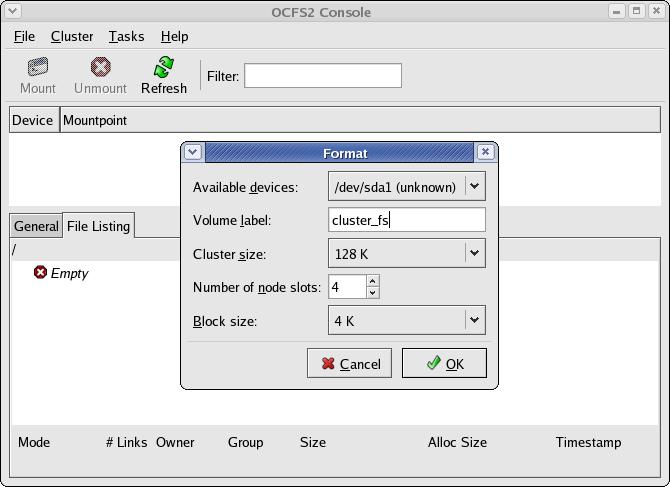
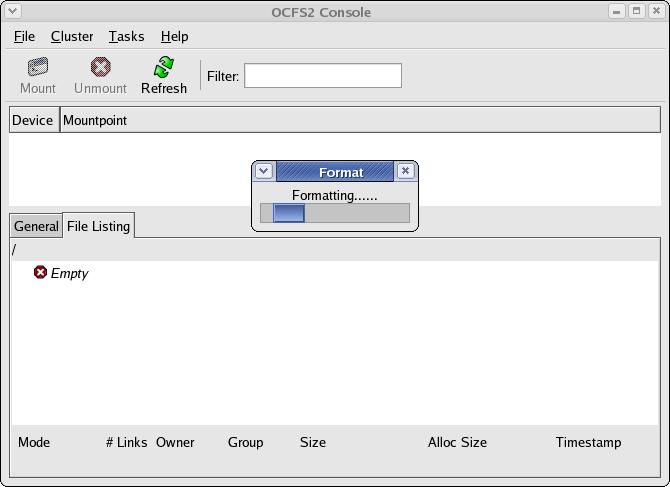
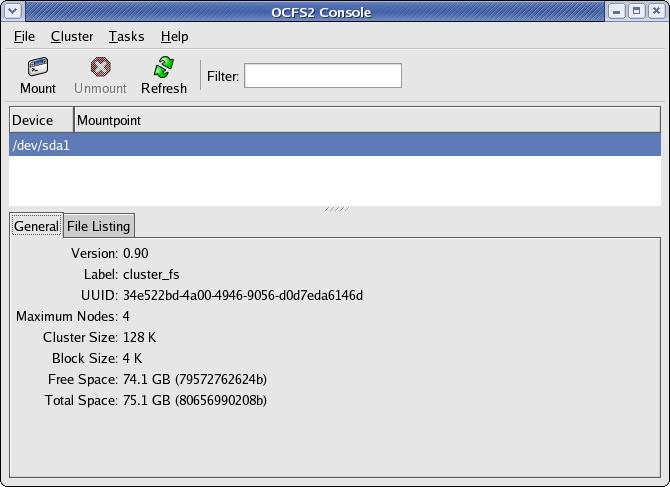
I
got the below error while ocfs2 being mounted on another node.
ERROR: While mounting the same filesystem on another node.
[root@node2-pub ~]#
mount -t ocfs2 /dev/sda1 /u02/ocfs2
mount.ocfs2: Transport endpoint is not connected while mounting /dev/sda1 on
/u02/ocfs2. Check 'dmesg' for more information on this error.
Solution: Disable the SELinux and Firewall on all the RAC nodes.
Download the below rpms and install them as root user on both
the nodes.
[oracle@node2-pub ~]$ uname -a
Linux node2-pub.hingu.net 2.6.9-55.0.2.EL #1 Tue Jun 26 14:08:18 EDT 2007 i686
i686 i386 GNU/Linux
[root@node1-pub rpms]#
rpm -ivh oracleasm-2.6.9-55.0.2.EL-2.0.3-1.i686.rpm \
> oracleasmlib-2.0.2-1.i386.rpm \
> oracleasm-support-2.0.3-1.i386.rpm
Preparing...
########################################### [100%]
1:oracleasm-support
########################################### [ 33%]
2:oracleasm-2.6.9-55.0.2.########################################### [ 67%]
3:oracleasmlib
###########################################
[100%]
[root@node1-pub rpms]#
Configure ASM on both the nodes
[root@node1-pub ~]#
/etc/init.d/oracleasm configure
Configuring the Oracle ASM library driver.
This will configure the on-boot properties of the Oracle ASM library
driver. The following questions will determine whether the driver is
loaded on boot and what permissions it will have. The current values
will be shown in brackets ('[]'). Hitting <ENTER> without typing an
answer will keep that current value. Ctrl-C will abort.
Default user to own the driver interface []: oracle
Default group to own the driver interface []: dba
Start Oracle ASM library driver on boot (y/n) [n]: y
Fix permissions of Oracle ASM disks on boot (y/n) [y]:
Writing Oracle ASM library driver
configuration:
[ OK ]
Creating /dev/oracleasm mount
point:
[ OK ]
Loading module
"oracleasm":
[ OK ]
Mounting ASMlib driver
filesystem:
[ OK ]
Scanning system for ASM
disks:
[ OK ]
[root@node1-pub ~]#
[root@node1-pub
~]# /etc/init.d/oracleasm createdisk DSK1 /dev/sdb1
Marking disk "/dev/sdb1" as an ASM
disk:
[ OK ]
[root@node1-pub ~]# /etc/init.d/oracleasm createdisk DSK2 /dev/sdc1
Marking disk "/dev/sdc1" as an ASM
disk:
[ OK ]
[root@node1-pub ~]# /etc/init.d/oracleasm createdisk DSK3 /dev/sdd1
Marking disk "/dev/sdd1" as an ASM
disk:
[ OK ]
[root@node1-pub ~]# /etc/init.d/oracleasm createdisk DSK4 /dev/sde1
Marking disk "/dev/sde1" as an ASM
disk:
[ OK ]
[root@node1-pub ~]# /etc/init.d/oracleasm scandisks
Scanning system for ASM
disks:
[ OK ]
[root@node1-pub ~]# /etc/init.d/oracleasm listdisks
DSK1
DSK2
DSK3
DSK4
[root@node1-pub ~]#
[root@node1-pub ~]# /etc/init.d/oracleasm status
Checking if ASM is
loaded:
[ OK ]
Checking if /dev/oracleasm is
mounted:
[ OK ]
[root@node1-pub ~]#
On the other node, you only need to execute the below command to show
these disks up there.
[root@node2-pub ~]#
/etc/init.d/oracleasm scandisks
[root@node2-pub ~]# /etc/init.d/oracleasm listdisks
DSK1
DSK2
DSK3
DSK4
REFERENCES: